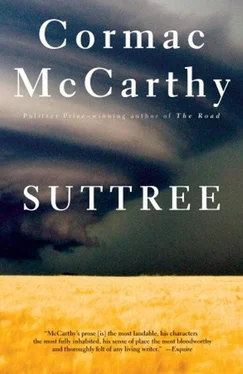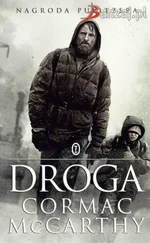I used to work on the river. The Cherokee. Then I was on the Hugh Martin. The H C Murry. It had a better store than them uptown. After the first war they wasnt no more packetboat trade. I was born in nineteen and hundred. Of a night you could hear them boats howlin on the river like souls. The old Martin had a steamhorn could and used to did bring the glass out of folks’ sashes. I went on the river when I was twelve. I weighed a hunnerd and eighty pound then. This white man shot me cause I whipped him. I didnt know no better. I was older then, must of been fourteen. Dumb as shit. I went home and got better and fore I could see him to kill him somebody had done done it. Cut his head off. Wasnt no friend of mine. Thowed my black ass in the jailhouse. Went up the side of my head with they old clubs and shit. I laid there in the dark, they aint give me nothin to eat yet. That was my first acquaintance of the wrath of the path. That’s goin on forty year now and it dont signify a goddamn thing. These bloods down here think it’s somethin to whip up on some police. They think that’s really somethin. Shit. You aint got nothin for it but a busted head. You caint do nothin with them motherfuckers. I wouldnt fight em at all if I could keep from it.
Suttree bent to see his face. Jones blinked, eyeballs like eggs in the mammoth black skull. He must have read his pale friend’s look because he said almost to himself: That’s the truth.
How did you get out?
They found his head. Man had it in a shoebox.
He was unscrewing the bottlecap, taking a drink. His eyes closed and opened slowly in the gloom. This man was a gambler and a whoremaster. He never drunk nor smoked. Run a whorehouse on Front Street that was well known in them days. Boats come in, the hands would all turn out for his place. Streets full of whores, queers any color. Thieves. They come out like roaches whenever you had a dockin. Then this feller cut his head off and carried it around in a shoebox with him. He got drunk one night down on Central Avenue and started showin the old head around. Folks runnin screamin into the streets. Next day I’s out.
Was he crazy?
Who?
The murderer.
I dont know. He didnt kill him to rob him. I guess he was a little bit crazy.
Would you have killed him?
I dont know. I reckon I would if that was how he’d of wanted it.
Suttree took a sip of his beer. He could hear Smokehouse in the outer room again, puttering about, glass clinking. He looked at Jones. Have you ever killed anyone? he said.
Not on purpose, said Jones.
It was dark when he came in from running his lines. The nose of the skiff broaching rafts of drifted trash and skeins of shorelight in the black river. Radio music from a shack on Front Street carrying clearly over the night waters. The slamming of a door. He could see the lights at Ab Jones’s and downriver he could see the fire at the goatman’s camp with the goatman’s cart in silhouette and dark goat shadows shifting in the forward reach of light. He boated the oars and stalled against the tirecasings alongside his houseboat and stood up in the skiff and made fast.
He had a livebox made from angleiron and chickenwire hanging in the river by a rope and he hauled this up and opened the top and transferred the fish from the boat to the box and lowered it into the river again. Then he hefted a small catfish up from the floor of the skiff, holding it by the gills, and climbed over the rail and went down the walk to the river path and down to the goatman’s camp.
A few people were gathered at the fire. When Suttree came up the goatman turned as if he’d sensed him there and he smiled and nodded.
I thought you’d forgot me.
I brought your fish.
I see you did.
You’ve not eaten supper have you?
No no. You?
Suttree shrugged.
You welcome to share with me if you like.
I dont much like fish.
That there is a nice one.
Suttree handed down the fish and the goatman took it and held it to the fire to see.
What do I owe you?
I dont know, said Suttree. We can trade it out if you like.
Trade it out, said the goatman. I dont know what I’d trade. Aint got nothin but some picture postcards I sell.
That’ll be okay.
Postcards?
Sure. Why not?
The goatman looked at Suttree, then rose and turned toward the wagon. The eyes of the visitors at his fire followed him. He rummaged through his duffel and called out to Suttree. How many you want?
I dont know. What do you get for them?
Ten cents.
Well, what about a half dozen?
He came from the wagon with the cards. The fish bowed and shivered in the firelight.
Take these, he said.
Suttree took the cards. The cards were old but the goatman by the fire was not changed from him that posed upon them.
Okay, said Suttree.
Aint no need to rush off.
What makes you think I was rushing off?
I dont know. But you welcome to stay.
I’d better get on.
The goatman watched him. He was trudging out across the field with his chin down so that withdrawing in the firelight he looked like a headless revenant turned away from the warmth of men’s gatherings.
Say, called the goatman.
Suttree turned.
You know if you had you a goat or two down here they’d be good company. You never would be lonely.
What makes you think I’m lonely? said Suttree.
The goatman smiled. I dont know, he said. I aint wrong.
It is told first by Oceanfrog Frazer to idlers at the store. How a madman came down from the town and through the steep and vacant lots above the river. Frazer saw him plunging past in a drunken run, fording a briarbush with no regard and on across the stony yard until he was capsized by a clotheswire.
He’s murdered someone, Oceanfrog said.
The fallen man mauled at the earth like a child, not even putting a hand to his throat where the wire had all but garroted him. He scrabbled off on hands and knees across the dirt and soon he was running again. He ran fulltilt into the barbedwire fence at the lower end of the lot.
He’s crazy, said Oceanfrog. He stepped to the door and called to him.
The man turned. His clothing was ripped and the shreds of his shirtfront lifted about him like confetti in the breeze and he was covered with blood.
What are you doing? called Oceanfrog.
The man screamed. A high parched gurgle like a rutting cat. Then he turned and ran again, following the fence, out of the lot, crashing through the crude pole gate and crossing the road and disappearing in the fields by the river.
A few dead bats or dying appeared in the streets. Roving bands of unclaimed dogs were herded off to the gas chamber. Harrogate kept himself attuned, somehow fearing that he might be next. One day by Suttree’s he said he’d seen a bat.
A dead one?
Just up yander.
You’d better go get it, said Suttree. It’s worth a dollar.
It’s worth what?
A dollar. You have to take it to the Board of Health. It was in the paper.
You’re shittin me.
No, it’s worth a dollar.
Why would anybody want to give a dollar for a old dead bat?
They think they’ve got rabies. It says not to touch them, just scoop them up and put them in a bag.
Harrogate had already started out the door.
Hey Gene.
Yeah.
Do you know where to take it?
No, where do I go?
General Hospital. Out Central.
Yeah. I know where it’s at. That’s where they took me.
It was true. Legal tender for all debts public and private. He had the bill changed at Comer’s, dropping it with a careless flourish onto the glass countertop. He took the change downstairs to Helm’s and got a dollar for it and changed the dollar at the Sanitary Lunch but no one seemed to notice. Already schemes were clambering through his head. He bought a chocolate milk and sat wedged in the row of theatre seats at Comer’s before a twodollar check game and pondered and sipped the milk.
Читать дальше












